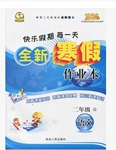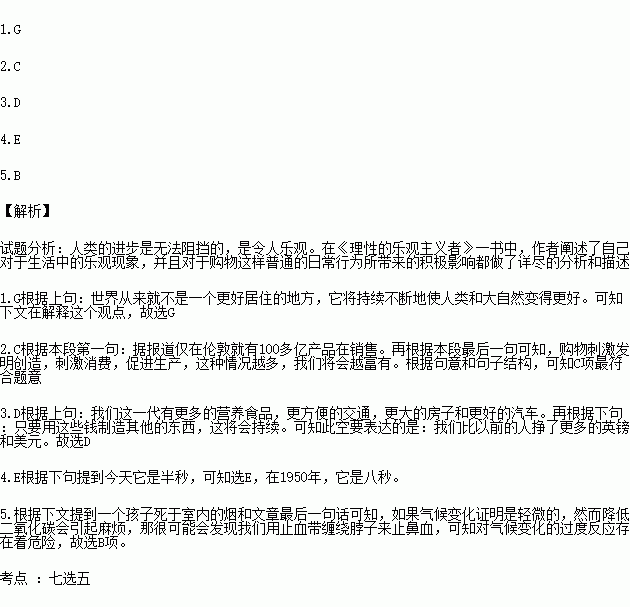题目内容
根据短文内容,从短文后的选项中选出能填入空白处的最佳选项。选项中有两项为多余选项。
Having bad feeling about world? “Cheer up.” says science writer Matt Ridley. “The world has never been a better place to live in, and it will keep on getting better both for humans and for nature.” 1.
1. 2.
It is reported that there are more than ten billion different products for sale in London alone. Even allowing for the many people who still live in poverty, our own generation has access to more nutritious food, more convenient transport, bigger houses, and better cars. 3. This will continue as long as we use these things to make other things. The more we specialize and exchange, the better off we'll be.
2.Brilliant advances
One reason we are richer, healthier, taller, cleverer, longer lived and freer than ever before is that the four most basic human needs—food, clothing, fuel and shelter—have grown a lot cheaper. Take one example. In 1800 a candle providing one hour's light cost six hours' work. In the 1880s the same light from an oil lamp took 15 minutes' work to pay for. 4. Today it's half second.
3.Let's not kill ourselves for climate change
5. A child that dies from indoor smoke in a village, where the use of fossil-fuel (化石燃料) electricity is forbidden by well-meaning members of green political movements trying to save the world, is just as great a tragedy as a child that dies in a flood caused by climate change. If climate change proves to be mild, but cutting carbon causes real pain, we may well find that we have stopped a nose-bleed by putting a tourniquet (止血带) around our necks.
A. Ridley calls himself a rational optimist—rational, because he's carefully weighed the evidence.
B. Overreaction to climate change could prove just as damaging to human welfare as climate change itself.
C. Shopping fuels invention.
D. And, of course, we earn more pounds and dollars than any who lived before us.
E. In 1950 it was eight seconds.
F. It’s high time that we took immediate action to fight climate change.
G. Here's how he explains his views.
 桃李文化快乐暑假武汉出版社系列答案
桃李文化快乐暑假武汉出版社系列答案 优秀生快乐假期每一天全新寒假作业本系列答案
优秀生快乐假期每一天全新寒假作业本系列答案
